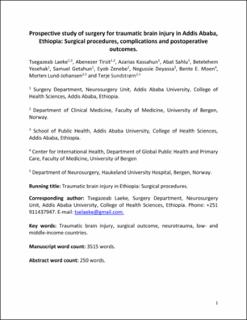Prospective Study of Surgery for Traumatic Brain Injury in Addis Ababa, Ethiopia: Surgical Procedures, Complications, and Postoperative Outcomes
Teklemariam, Tsegazeab Laeke; Aklilu, Abenezer Tirsit; Kassahun, Azarias; Sahlu, Abat; Yesehak, Betelehem; Getahun, Samuel; Zenebe, Eyob; Deyassa, Negussie; Moen, Bente Elisabeth; Lund-Johansen, Morten; Sundstrøm, Terje
Journal article, Peer reviewed
Accepted version
Permanent lenke
https://hdl.handle.net/11250/2987388Utgivelsesdato
2021Metadata
Vis full innførselSamlinger
- Department of Clinical Medicine [2065]
- Registrations from Cristin [9766]
Sammendrag
Background
Traumatic brain injury (TBI) is an important cause of trauma-related mortality and morbidity in Ethiopia. There are significant resource limitations along the entire continuum of care, and little is known about the neurosurgical activity and patient outcomes.
Methods
All surgically treated TBI patients at the 4 teaching hospitals in Addis Ababa, Ethiopia were prospectively registered from October 2012 to December 2016. Data registration included surgical procedures, complications, reoperations, discharge outcomes, and mortality.
Results
A total of 1087 patients were included. The most common procedures were elevation of depressed skull fractures (49.5%) and craniotomies (47.9%). Epidural hematoma was the most frequent indication for a craniotomy (74.7%). Most (77.7%) patients were operated within 24 hours of admission. The median hospital stay for depressed skull fracture operations or craniotomies was 4 days. Decompressive craniectomy was only done in 10 patients. Postoperative complications were seen in 17% of patients, and only 3% were reoperated. Cerebrospinal fluid leak was the most common complication (7.9%). The overall mortality was 8.2%. Diagnosis, admission Glasgow Coma Scale (GCS) score, surgical procedure, and complications were significant predictors of discharge GCS score (P < 0.01). Age, admission GCS score, and length of hospital stay were significantly associated with mortality (P ≤ 0.005).
Conclusions
The injury panorama, surgical activity, and outcome are significantly influenced by patient selection due to deficits within both prehospital and hospital care. Still, the neurosurgical services benefit a large number of patients in the greater Addis region and are qualitatively comparable with reports from high-income countries.

